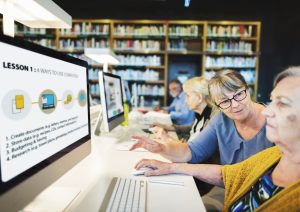
Click on the below link to read the presentation.

Presentation – Inspiration Report: Mobile Libraries & Labs by Brooke Porter Katz

Click on the below link to read the presentation.

Presentation – Inspiration Report: Mobile Libraries & Labs by Brooke Porter Katz
Click in the bottom right to expand and watch the presentation, or use this link: https://www.canva.com/design/DAGt1r8boB4/D2f66Tddnspe0iJ9b6WgKA/edit?utm_content=DAGt1r8boB4&utm_campaign=designshare&utm_medium=link2&utm_source=sharebutton

Thanks to the flexible assignment deadlines, I’m completing the reflection posts before my Innovation Strategy Roadmap. I was excited to see that this module supported my work-in-progress roadmap, which centers around the idea of “library as classroom”—specifically a place where teenagers can learn important life skills they typically aren’t exposed to in school.
Despite being written 11 years ago, much of the 2014 paper The Public Library as a Community Hub for Connected Learning still feels very relevant today. Of course, most people have not just “recently started using the internet”—but the need to develop digital skills still applies. Similar to how librarians are not always trained in social work (mentioned in a previous reflection), ”librarians don’t always have all the skills needed in order to satisfy the digital learning needs of all groups.” And then an important “but”: “…but they have the ability to connect people.”
This connecting of people is such an important point—one that hinges on community and a librarian’s ability to seek out and develop relationships with people or organizations to help serve the needs of its patrons.
The paper goes on to list examples of “connected” libraries, and I thought the mobile FryskLab in the Netherlands was especially cool. Here’s a description from another link I found: “FryskLab aims to generate interest in technology and maker skills, thereby stimulating digital literacy…. Its goal is to (re)vitalize children’s enthusiasm for technology, but above all, the 21st-century skills that are essential for being qualified in the (near) future: entrepreneurship, information sharing, collaboration, problem-solving, and creativity.”
A theme that has been woven throughout this course is the importance of not using technology for technology’s sake—it should be used in meaningful ways that engage and teach people (both young and old). Should I find myself working in a public library setting, I now feel more equipped to be able to critically evaluate programs and determine if they are designed in a way that promotes the core values in the paper: equity, full participation, and social connection.
I was also so inspired by the list of “unexpected offerings” in the Huffington Post article 8 Awesome Ways Libraries Are Making Learning Fun, especially the programs that involved partnering with other organizations. If I lived in Minnesota, I know my kids would love the “Collector’s Corner” at the Saint Paul Public Library, a partnership with the Science Museum of Minnesota that invites patrons to bring a natural item to the library—think rocks, pebbles, and pinecones—and learn more about it and also trade them for other items in the collection. The whole list is definitely worth checking out. It’s inspiring to see libraries creating innovative programs to help its community learn about new technologies, but also embracing more analog/no-tech activities at the same time. Because, in the end, they are both important.
References
Lloyd, M. (2015, July 8). 8 awesome ways libraries are boosting community connectedness. HuffPost. https://www.huffpost.com/entry/8-awesome-ways-libraries_b_7157462
Nygren, A. (2014, August). The public library as a community hub for connected learning. Paper presented at IFLA WLIC 2014 — Lyon, Session 167: Management and Marketing with Public Libraries, Lyon, France.
Universo Abierto. (2020, February 16). FryskLab: el laboratorio móvil de las bibliotecas holandesas. Universo Abierto. https://universoabierto.org/2020/02/16/frysklab-el-laboratorio-movil-de-las-bibliotecas-holandesas/

Before I began volunteering at my local public library, I had an informational interview with the head librarian so I could ask her questions about her career. One of the first things she said to me—besides, “Don’t become a librarian just because you love books”—was that working as a librarian was often like being a social worker. “It’s a public place, which means that no matter who you are, you are free to come here,” I remember her saying.
I wholeheartedly believe that everyone should be welcome—and that libraries should meet patrons where they are, including those who may be unhoused or struggling with mental illness and need help with more than just finding information or a book to read. But, as mentioned in this article, librarians aren’t “always best equipped to help the people who show up.” (Hogsten, 2023)
That’s where social workers come in. I think it is such a smart idea to do more than just partner with local organizations, the way many public libraries already do, and instead hire someone full time with a background in social work who can create programs and be available to help patrons who need it, the same way librarians at the reference desk are available. (It makes me wonder, why did it take so long for this to become a reality?)
According to Nicole Campolucci, a licensed social worker at Salt Lake City Public Library, their work can include “a pair of socks, or helping someone obtain a new ID or bus voucher, or apply for food stamps. It could also be providing suicide intervention or crisis de-escalation.” (Hogsten, 2023)
As I started researching more on this topic, I found that in recent years, more libraries have been hiring social workers, including the Central Library in downtown Indianapolis. (Benson, 2022) I also came across an ALA blog post called “Social Workers and Librarians— A Case for Why We are BFFs” by Amy Schofield, Community Outreach Manager at Richland Library. In it, she writes, “When we honestly look at the types of questions we’re getting and what our patrons really need, it’s clear that social workers are our perfect counterparts.”
Patrons aren’t the only ones who are benefitting—librarians are, too. Adds Schofield, “Having social workers as an option is a huge relief to staff who often want to help but aren’t sure how. Social work skills have also found their way into staff trainings on extremely important issues such as dealing with patrons in crisis, handling situations where children and vulnerable adults are in danger, and even self-care, issues that every public librarian faces but are not covered in our library training.”
As a future information professional, I think it’s important to approach any future career path with eyes wide open, understanding that being a librarian will include helping vulnerable populations overcome everyday challenges. These articles have shown me that if I do pursue a career as a public librarian, it will be important to develop additional skills so I can be better equipped to help whoever comes through the doors.
References
American Library Association. (n.d.). Social workers in libraries: A powerful partnership. Office for Diversity, Literacy and Outreach Services (ODLOS). https://www.ala.org/advocacy/diversity/odlos-blog/social-workers
Benson, D. (2022, January 3). Why your local library might be hiring a social worker. NPR. https://www.npr.org/sections/health-shots/2022/01/03/1063985757/why-your-local-library-might-be-hiring-a-social-worker
Hogsten, L. (2023, June 20). Salt Lake City downtown library’s new social worker has already helped thousands. The Salt Lake Tribune. https://287.hyperlib.sjsu.edu/wp‑content/uploads/2024/10/Salt‑Lake‑City‑downtown‑librarys‑new‑social‑worker‑has‑already‑helped‑thousands.pdf

There’s no denying AI is here to stay—and as a parent, I’m especially consumed with how it will impact young people and their ability to learn how to think critically. I recently attended my 25th high school reunion, and a current junior gave me a tour of the campus. As we were walking, I asked him if he and his friends used AI to do their work and he said that yes, they all do. He went on to tell me that his teachers have actually created lessons on how to use AI effectively as a tool, rather than as a method of cheating—which admittedly is how I think kids most often use it. I was heartened to hear that steps were being taken to teach students how to use AI responsibly (though I imagine some still do use it to cheat).
This conversation, as well as the readings from the New Horizons modules, has me thinking deeper about AI in the classroom and ways teachers and information professionals can incorporate it rather than fight it. My gut reaction thus far has been against AI in the classroom, but the 2025 Educause Report makes a lot of great points, supporting the idea that the better approach is to proactively educate students about AI and how to use it the right way. The report also includes how AI could help democratize learning, and I am all for any tools or technology that makes education more inclusive and accessible.
A few of the ideas from the report include:
Create policies to guide students’ use of AI tools. Be transparent with students about what you expect from them, including the reasoning behind your policies rather than only presenting them with rules.
Provide students with opportunities to experiment with AI tools. Foster an environment of exploration for students to think critically about AI tools. Students need to be able to investigate AI tools to authentically learn about their potential benefits and risks.
Talk to your students. Ask students whether and how they want to use generative AI for their learning. They might be able to find some interesting and helpful AI tools (a skill in itself), or they might even tell you they’re not interested in using generative AI at all.
This module also made me think back to a conversation I had with a former coworker, whose husband is a high school history teacher in New York City. He said students have been using AI to write complete essays, and that they all sound pretty much the same. As a writer and editor by profession, I am most discouraged by this use of AI—that it takes what is supposed to be a creative endeavor, something so tied to the individual, and makes it sound like, well, a robot wrote it.
Asking AI to write content from scratch is a use of AI that experts also warn against. I appreciated the article by Allison Papini, Assistant Director/ Manager of Research and Instruction Services at Bryant University, which looks at ChatGPT “through the lens of information literacy.” With regards to writing, she says, “ChatGPT is a great way to get started brainstorming, or if you want to write a general overview of a topic, but it is often vague and even inaccurate, and is not a substitute for human writing.”
I also found myself nodding my head as I read the interview with Tom Moriarty, where he says, “Writing is generative and creative. Artificial intelligence applications like ChatGPT are imitative and mimetic (which is a fancy word for imitative). Writing makes you smarter. Writing makes you unique. ChatGPT makes you sound like everybody else. Which, I guess, makes you forgettable.”
References
EDUCAUSE. (2025, May). 2025 Horizon Report: Teaching & Learning edition [PDF]. https://library.educause.edu/-/media/files/library/2025/5/2025hrteachinglearning.pdf
Halprin Jackson, J. (2023, February 14). Chatting with ChatGPT: Deep Dive in Five with Tom Moriarty. San José State University NewsCenter. https://blogs.sjsu.edu/newsroom/2023/chatting-with-chat-gpt-deep-dive-in-five-with-tom-moriarty/
Papini, A. (2023, January 27). ChatGPT: A library perspective. Krupp Library, Bryant University. https://library.bryant.edu/chatgpt-library-perspective